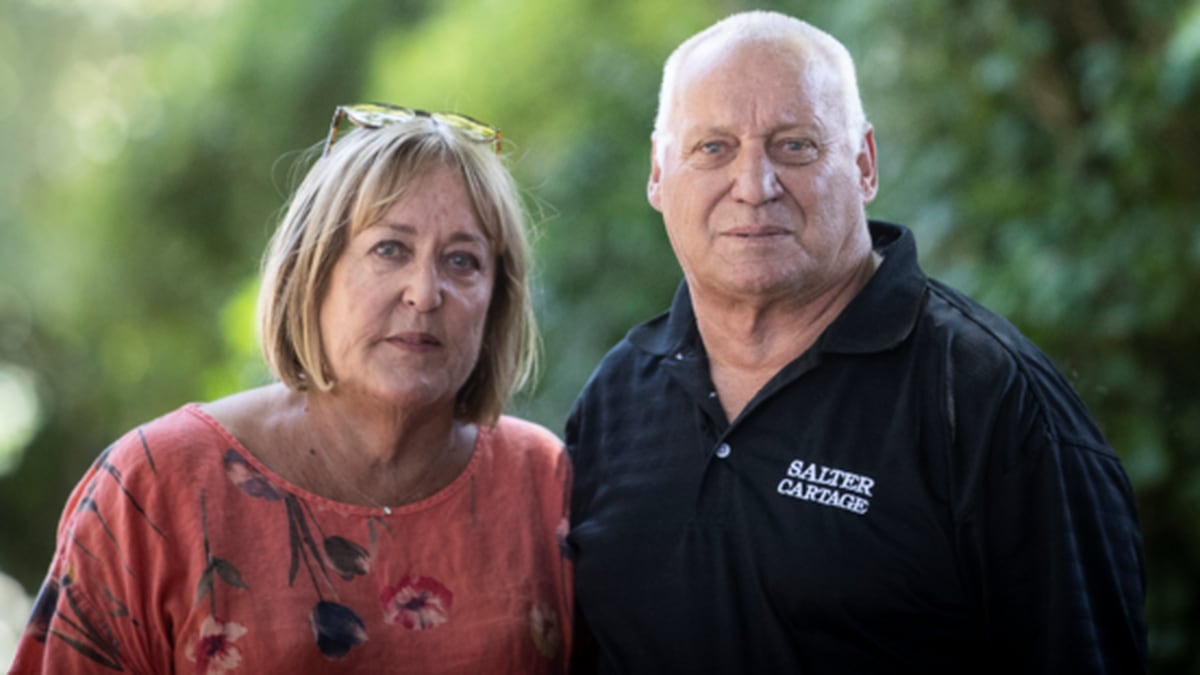Natalie and Ron Salter at their home outside Auckland. Photo / Jason Oxenham
Ron Salter pleaded guilty to a range of health and safety charges after a contractor died at his South Auckland business. Two years later police turned up claiming his health and safety failings meant his business was operating outside the law and it was taking a “proceeds of crime” case against the business owner. David Fisher reports on the latest turn in the courts – and how much money police are seeking.
The amount of money a businessman and his family face losing as the result of a novel police action over a workplace death has been revealed – a whopping $11 million which would go in a first-of-its-kind “proceeds of crime” case.
And it comes with a warning that other businesses could be next if police are successful in this case.
Ron and Natalie Salter built their lives around Salters Cartage, the business they grew from a single truck to having a fleet of vehicles that collect waste fuel and either dispose of it or have it recycled.
The 2015 death of Jamey Lee Bowring, 24, changed everything.
/cloudfront-ap-southeast-2.images.arcpublishing.com/nzme/3OJTVAULPCA7PRX2ER55VGLGTI.jpg)
The young man was atop Tank 20 at the Salters’ yard in Wiri, South Auckland, when it exploded. It was later discovered he had been welding on the tank, unaware it contained a flammable mix of fumes with an ignition point around 17 degrees Celsius.
Subsequent investigation found a range of health and safety breaches to which Ron Salter pleaded guilty after a WorkSafe NZ prosecution.
He paid around $400,000 in fines and was sentenced to 4½ months’ home detention.
That was in 2017. Two years later, police laid fresh proceedings in which they argued Ron and Natalie Salter, and their business Salters Cartage Limited, was “systemically non-compliant with health and safety and hazardous substances law” and operated “blatantly and dangerously for at least seven years”.
As a result, police said it was seeking the “proceeds of crime” through the High Court. In doing so, it took legislation introduced with political speeches about recouping money from gangs and methamphetamine dealing and applied it to laws impacting on every business in the country.
Rather, police claimed “pursuit of profit drove” the Salters to “commit significant criminal activity” with years of poor health and safety compliance that only emerged when Bowring was killed welding on top of a 96,000-litre tank filled with dangerous fumes.
What police want revealed
The $11m price tag for Salter and family was revealed in a Court of Appeal judgment that has just been released. It is a new detail that actually puts a dollar figure on what is at risk for the Salters and the 40 years of life invested in building their business.
It’s a legal contest with high stakes on all sides with the judgment underscoring the police need to offer an undertaking to pay the Salters any losses they might incur if the case should fail.
The issue of an undertaking was the trigger for the case to shift from the High Court to the Court of Appeal after a finding by Justice Dr Matthew Palmer that police were obliged to underwrite its case against the Salters.
The Court of Appeal found he was right to do so on the basis that the case against Salters could impact on the business it did or the money it might get from selling up, or both.
/cloudfront-ap-southeast-2.images.arcpublishing.com/nzme/EUV63HZDDG27EJCYLRPGWSJOUM.jpg)
The Court of Appeal – heard by Justices Cooper, French and Collins – upheld that ruling, saying the “theories of loss” had been made out by the Salters. Those were the claims that the police court action impacted on the company’s ability to borrow to expand, and also meant the Salters would likely get less for the business when trying to sell it.
The judges dismissed a police claim that an “undertaking” for damages would have a “chilling effect” – that is, it would put police off taking similar cases in the future. The Court of Appeal said the police had not put forward evidence to argue that claim, whereas lawyers acting for the Salters said claims by the Crown that it had a strong case “undermine any claim to a chilling effect”.
The Court of Appeal judgment found there were three properties that had been restrained and were at risk of being forfeit to the Crown – the Salter family home, the home of their daughter and son-in-law who worked for the business, and a family holiday home.
The value of the forfeiture attempt by the Crown was “$10,927,883.90″, the judgment said.
Court – ‘First hurdle cleared’
In relation to the case against the Salters, the Court of Appeal judges said “the first hurdle has been cleared” because Ron Salter had pleaded guilty to a range of charges brought by WorkSafe.
The Court of Appeal said it was “significant that some of the underlying criminal activity has been established” through the guilty pleas.
However, it would not go further than the High Court’s finding that police had an “arguable case that could result in some sort of forfeiture orders”.
The Court of Appeal found – as did the High Court – that there were “live issues” about using “proceeds of crime” legislation in a case that was markedly different to those used as examples when Parliament passed the relevant law more than a decade ago.
/cloudfront-ap-southeast-2.images.arcpublishing.com/nzme/4JOURZ6CVBFTPNL6QUG36Q64GQ.jpg)
Hansard records show that the weight of speeches from politicians at the time was focused on gang activity and the manufacture and sale of methamphetamine.
Sarah Ferguson, the mother of Jamey Lee Bowring, did not wish to comment on the Court of Appeal judgment.
A spokesman for Salters Cartage Limited, Matthew Blomfield, said the Court of Appeal’s finding an undertaking was required “should be welcomed by all New Zealand businesses despite the chill such a proceeding brings to business certainty in an already difficult financial climate”.
“This is simply an enforceable promise that, if the Commissioner’s test case is unsuccessful, he will compensate (Salters Cartage) for any losses suffered by (the company) as a result of being subjected to the draconian remedy of restraining orders.”
Test case: ‘Treated like guinea pigs’
It had been claimed by the Salters that police were treating their business as a “guinea pig” and would expand to others if successful.
Blomfield said the obligation on police to pay for losses incurred if its case was unsuccessful was “obvious and only fair”.
He said the type of case attempted by police with Salters Cartage had never been previously attempted.
The company never wanted a repeat of such an incident as that which took Bowring’s life, he said.
The consequence, he said, was that Salters Cartage could not be sold and it was unable to borrow money to invest in or develop the business without getting permission from police.
He said the restraining orders could “cripple” the company “‘and the family that built it”, or undermine the company’s financial stability.
/cloudfront-ap-southeast-2.images.arcpublishing.com/nzme/ZPNO7AWNUBAKFK6HIW3HP4PCVU.jpg)
Blomfield said the police case aimed to seize homes and other property for a workplace accident in which Ron Salter had been prosecuted, convicted and served his time. By the time of the hearing in the case later this year, he said the property would have been restrained for around five years.
He warned that the police case – if successful – had the potential to impact businesses across the country with 1201 notifiable incidents in 2023 and 40 fatalities. He said “many businesses” could be the next Salters Cartage.
Salters Cartage was launched about 40 years ago and had grown to a business of 25 staff and around 3000 customers.
In the wake of the accident, Ron Salter spoke to the Herald of his anguish over the fatal incident at his business. Inquiries by the Herald found Ron Salter had previously been convicted of careless driving causing death.
David Fisher is based in Northland and has worked as a journalist for more than 30 years, winning multiple journalism awards including being twice named Reporter of the Year and being selected as one of a small number of Wolfson Press Fellows to Wolfson College, Cambridge. He joined the Herald in 2004.




 Hear me out: Demolish Premier House and make all the MPs live together
Hear me out: Demolish Premier House and make all the MPs live together